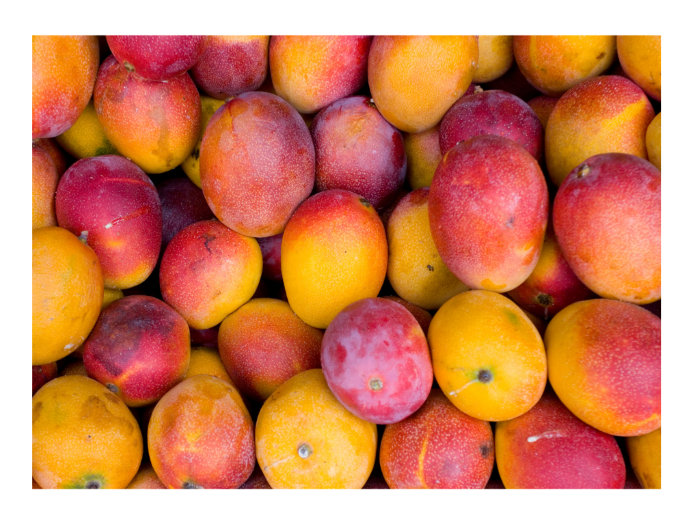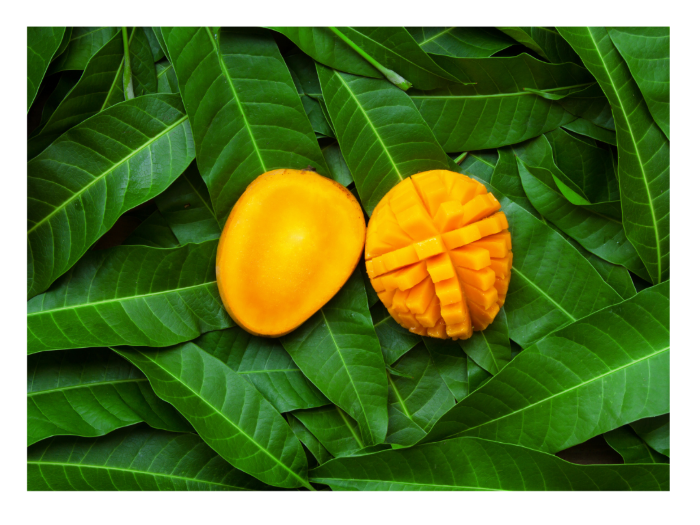Like many rabbit enthusiasts and new rabbit owners on the internet, you may be wondering, “Can my Rabbit eat fruit – what fruits can my bunny eat – can rabbits eat mangoes?”
Yes, rabbits can eat mango, as long as it is in moderation and/or as a treat.
Rabbit treats should not amount to more than 5% of the rabbit’s diet. Mangoes are chock full of nutrients, but like most fruits they are too sweet for the rabbit’s sensitive digestive system and so they are an infrequent treat food for rabbits.
The video about fruits for rabbits is very well done.
It is the best 4 minutes you will spend on rabbits today!
I was surprised at the Rabbit’s reaction to Mango!
Fun Fact: The Plural of Mango is both Mangos and Mangoes!
Can Rabbits Eat Mangos Safely?
A mango is a tropical stone fruit that originated in India over 5000 years ago and is heavily cultivated in South America today, and in over 100 countries around the world. Mangoes are farmed and then shipped to markets all over the world.
Many people love the sweet, tangy flesh of the mango fruit and eat and digest mango without any problem. Mangoes are chock full of nutrients, natural sugars, and soluble fiber. Now mangos are not toxic to rabbits who often also love the sweet, tangy flesh of the mango. However, we recall and stress the point that the rabbit does not digest fruit very well. So this is a concern to elaborate on.
Too much fruit may lead to digestive issues and other maladies for your bunny. Also, too much sugar can lead to obesity and irregularities in the rabbit’s sensitive and complex digestive system.
Can bunnies eat mangos? For the reasons mentioned, and other reasons we will discuss, mangoes should be considered an infrequent treat for rabbits.
The famous House Rabbit Society reminds us that sugary fruits like mangoes are treats for rabbits. It is beneficial that the sugar in the mango is a natural sugar, vice a processed sugar. However, the Rabbit Digestive System will try to convert the extra sugar in the mango to fat, and may become stressed in doing so. Additionally, some of the excess sugar may end up in the cecum. The bacteria in the cecum will bloom or over-produce on the extra sugar, upsetting the delicate balance of bacteria in the cecum.
Most rabbits do not need to put on weight. If your rabbit is a house rabbit or in a hutch most of the time, then it probably does not get enough exercise. Certainly, our domestic rabbits get less exercise than wild rabbits.
Further, this potential bloom or over-production of gut bacteria may lead to serious problems for the rabbit such as Gastrointestinal Stasis. Remember, the the best rabbit diet is:
- Unlimited hay (75% to 80% hay)
- Quality pellets (10% to 15%)
- Leafy green vegetables (5% to 10%).

Feeding Mangoes to Rabbits – Concerns
Common concerns associated with feeding mangos and other fruits to your rabbits are:
- Parasites – check the mangos for parasites so that your bunny does not become infested with parasites.
- Too Much, Too Fast – it is always best to introduce new foods, or foods that aren’t often fed to your rabbit, very slowly. This means very small amounts provided over several days.
- This allows the rabbit’s digestive system and its delicate balance of bacteria to adjust to the new or infrequent foods.
- Many owners provide too much new food, too quickly and do not allow for a smoother and proper transition in the rabbit’s gut.
- This allows the rabbit’s digestive system and its delicate balance of bacteria to adjust to the new or infrequent foods.
- Acidity – several fruits such as lemons, oranges and limes are known for their high acidity. Mangos also have relatively high natural acids. Too much acidity is not good for your rabbit.
- Over ripe – rotten or decaying mangoes, including those with many blemishes, may harbor a high bacteria level that may be harmful to your rabbit.
- Pesticides – Always thoroughly wash mango skin before providing it to your bunnies. Pesticides are used in commercial cultivation of many types of mangoes. We want to wash off as much dirt, grime, and residual pesticides as we can before providing mangoes to our rabbits.
Mango Health Benefits For Rabbits
Mango fruit is considered a drupe or stone, like a peach, because it has a single hard seed.
Mangoes are high in soluble fiber, which is good. Note however that it is the insoluble fiber, found in grass and hay, that helps drive the rabbit’s digestive system. Mangoes are also high in:
- Vitamin C – which is good for immune system health and collagen. Collagen is one of the building blocks for healthy rabbit skin, hair, muscle and bone. It also helps the rabbit absorb iron for stronger blood.
- Vitamin A – helping rabbit vision and immune system; as well as heart, lung, and kidney function.
- Antioxidants – are phytochemicals (biologically active plant-food components) that help breakdown free radicals in the rabbit.
- Sugar – One cup has about 22.5 grams. Not good for rabbits.
Here is a more extensive breakout on the nutrition in mango.
One cup (165 grams) of fresh mango provides:
- Calories: 99
- Protein: 1.4 grams
- Carbs: 24.7 grams
- Fat: 0.6 grams
- Fiber: 2.6 grams
- Sugar: 22.5 grams
- Vitamin C
- Copper
- Folate
- Vitamin B6
- Vitamin A
- Vitamin E
- Vitamin K
- Niacin
- Potassium
- Riboflavin
- Magnesium
- Thiamine
Mangoes are full of many healthy nutrients that are wonderful for the health of your bunny! Most rabbits will eat mango when offered.
Many rabbits will overeat mango if portions are not controlled.

Can Rabbits Eat Mango Skin, Mango Peels?
The skin or peel of the mango usually has a higher concentration of the healthy antioxidants and phytochemicals discussed above.
Mango Skin and Peels for Rabbits – Concerns
Pesticides – Mango peels are fairly tough and often bitter. In addition, like many commercially farmed fruits mangoes are often sprayed with pesticides. These pesticide residuals may reside on the mango skin and are not good for you or your rabbit.
Buying organic mangos may minimize this risk. Always wash the fruit thoroughly before eating or providing mango skin to your bunny.
Urushiol – is the chemical and active ingredient in poison ivy, poison oak, sumac and also in mango skin. There is some urushiol in mango skin. Some people react to the urushiol in mango skins with a rash, much like a mild case of poison ivy. It does not seem to affect many rabbits, but we recommend you introduce mango to your rabbit slowly and in small portions.
Can Bunnies Eat Dried Mango?
Yes, rabbits can have dried mango. Weaned bunnies can have dried mango when it is provided as an infrequent treat.
Dried mango generally provides the same wonderful vitamins and nutrients as fresh sliced mango. It also provides the same high level of extra sugar that rabbits do not need. One note of caution for “Can rabbits have dried mango” – dried mango slices may include sulfites. Sulfites are added to some foods to extend their shelf life. Sulfites are not good for your rabbit.
Can Rabbits Eat Frozen Mango?
Yes, rabbits can have frozen mango when it is provided as an infrequent treat. Frozen mango generally provides the same wonderful vitamins and nutrients as fresh sliced mango. It also provides the same high level of extra sugar that rabbits do not need.
Can Baby Bunnies Eat Mango?
The quick answer is No, baby rabbits should not eat mangoes. Baby bunnies under 4 to 7 weeks of age have more sensitive digestive systems than adult bunnies.
Further, the kit’s digestive system is growing and maturing as the bunny grows and matures. The baby bunny is eating mother’s milk and some of it’s mother’s cecotropes for proper nutrition and development of its evolving gut biome.

How To Prepare Mango for Your Rabbit
Preparing mango and other foods for your rabbit is a labor of love. You can follow these steps to properly prepare some mango for your rabbit.
- Thoroughly wash the mango to remove dirt, grime and residual pesticides.
- If feeding mango with the skin off, then carefully remove the tough skin with a sharp knife. If feeding with skin on then proceed to the next step.
- Cut the mango into small slices or cubes, about half inch by half inch.
- Place a measured amount into a clean bowl and provide it to your rabbit.
- Be sure to remove the feeding bowl any excess fruit later in the day.
How Much Mango to Feed My Rabbit?
Mango is a fruit so we follow the referenced House Rabbit Society feeding guide and provide no more than 1 teaspoon of mango for each 2lbs of rabbit body weight per day.
- Hay for rabbits – unlimited quantity of quality hay
- Pellets for rabbits – feed no more than ⅛ cup for 4lbs of rabbit body weight per day
- Leafy green vegetables for rabbits – 1 cup of greens for 2lbs of rabbit body weight per day
- Fruit – 1 teaspoon of fruit for 2lbs of rabbit body weight per day
How Often Can I Feed My Rabbit Mango?
Again, moderation of treats is one of the keys to keeping your rabbit happy and healthy.
Proper diet is one of the pillars to rabbit happiness and longevity.
As noted immediately above, we can feed not more than 1 teaspoon of fruit for 2lbs of rabbit body weight per day. Here is a great video about feeding fruits (mangoes included) to your rabbits.
Frequently Asked Questions Related To Bunnies Eat Mangoes
Can Rabbits Eat Freeze Dried Mango?
It depends – this WedMD article states that freeze-dried mango typically does not have added sugar, while candied or crystallized mango is soaked in sugar water before it is dried. The point is to understand ingredients before feeding your rabbit.
Can Rabbits Drink Mango Juice?
No rabbits should not drink mango juice. The juice is too high in sugar and may be too acidic for the health of your rabbit.
Can Rabbits Eat Cooked Mango?
No rabbits should not eat cooked mango or any cooked food. Rabbits should only eat raw foods. Their sensitive digestive systems are not designed to process cooked foods.
For some deep learning about the rabbit digestive system please view this embedded video by
The Rabbit Gut: Anatomy, Physiology, And Nutrition (House Rabbit Society Conference)
Final Thoughts on Bunnies Eating Mangoes
As we’ve discussed, adult rabbits may eat clean mangos in moderation.
Mangoes are packed with nutrition but they are very high in sugar and, like most fruits, should be considered an infrequent treat for rabbits.
Rabbits are not designed to digest high levels of sugar. Extra sugar is converted to fat and may also upset the natural balance of bacteria in the rabbit’s digestive system. This may lead to stress and serious health issues for our rabbit.
Want to know more about fruit for rabbits? You can click on this post:
Fruits Rabbits Can Eat

